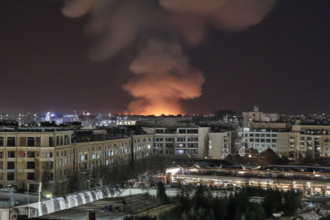Western Allies Weigh Response as Ukrainian President Zelensky Calls for Greater Military Support.
- Regarding Ukrainian appeals for expanded military options, how are Western allies responding?
- What Are the US and UK Doing Amid Escalation Concerns?
- How Do Iranian Missiles "Change the Debate"?
- What New Aid and Sanctions Have Been Announced?
- Why Are Calls for Long-Range Missiles Growing Louder?
- Is Iran Supplying Missiles to Russia, and What Are the Implications?
- Why Does Ukraine Need Long-Range Missiles?
UK Foreign Secretary David Lammy visited Kyiv to further the discussion on Ukraine’s capacity to employ Western-supplied long-range missiles against Russian targets after Iranian ballistic missiles were delivered to Russia. His remarks capture mounting worries about how Iran’s engagement in arming Moscow may affect the current crisis in Ukraine.
Regarding Ukrainian appeals for expanded military options, how are Western allies responding?
Following negotiations in London, Lammy visited Ukrainian President Volodymyr Zelensky alongside US Secretary of State Antony Blinken in the capital of Ukraine. Zelensky has repeatedly encouraged Western partners to loosen their limitations on using the acquired modern weaponry. Aimed at preventing further escalation of the war, Ukraine is not allowed to utilize long-range missiles provided by Western countries against targets within Russian territory at present.
Emphasizing the importance of recent events, Blinken said at a news conference in Kyiv: “We have now witnessed Russia receiving ballistic missiles from Iran, which will further enhance their aggression in Ukraine. Therefore, it would seem that Mr. Putin and Russia are the ones engaging in escalatory activity if any other is involved.”
Zelensky, who has stated that ongoing Western military aid determines Ukrainian success, underlined his need for more forceful backing. On Wednesday, he added, “Ukraine’s victory in the war against Russia depends mostly on the support of the United States.”
What Are the US and UK Doing Amid Escalation Concerns?
Both the US and the UK have been careful in deciding whether or not to remove limitations on Ukraine’s long-range missile usage. Lammy added, “I am not prepared to give Putin the advantage,” while declining to offer further information on whether modifications to present limits are being discussed.
US President Joe Biden has also hinted at a policy change for his government. “We are working that out now,” Biden remarked in response to inquiries over Ukraine’s possibility of getting permission to attack inside Russia. No official decision has been made, though.
Once news of Iranian ballistic missiles being delivered to Russia surfaced, the likelihood of lifting these prohibitions gained fresh relevance. Emphasizing this change, Ukrainian Foreign Minister Andrii Sybiha said, “lifting restrictions is important in the context of reports of a possible transfer of ballistic missiles to Russia by Iran.” He went on, “We must act boldly.”
How Do Iranian Missiles "Change the Debate"?
According to UK Foreign Secretary Lammy, Iran’s engagement in supplying missiles to Russia has drastically changed the strategic scene. “Iran giving Russia ballistic missiles clearly changes the debate, as they would allow Moscow’s forces to have further penetration into Ukraine,” Lammy said. “That is really dangerous.”
Lammy said, “We see this movement of ballistic missiles from Iran to Russia as we observe the Russians collaborating with their allies. We should help Ukraine more so it may succeed in its endeavors.”
Likewise, Blinken said Iran’s arming of Russia was a “significant and dangerous escalation.”
What New Aid and Sanctions Have Been Announced?
The US and the UK have responded to the mounting dangers by releasing fresh aid packages to strengthen Ukraine’s military and economic capacity. Lammy said the UK will donate £600 million ($780 million) to help Ukraine with “humanitarian, energy, and stabilization needs.”
Blinken also disclosed that the US will provide an extra $700 million in aid for demining operations and the energy sector.
The latest assistance commitments Target Tehran for providing Russia with ballistic missiles meant for use in the conflict against Ukraine, accompanied by more sanctions against Iran by the US, UK, France, and Germany. Over these charges, the UK government also called Iran’s top envoy to indicate the gravity with which Western countries are reacting to the developing danger.
Why Are Calls for Long-Range Missiles Growing Louder?
Ukraine Prime Minister Denys Shmyhal thanked Western politicians for the military help Ukraine has received throughout the war. Shmyhal did, however, also underline Ukraine’s ongoing need for long-range missiles to hit Russian targets precisely. Emphasizing Ukraine’s reliance on Western backing, he stated, “We hope that long-range equipment for strikes on our enemy’s territory will be reached, and we will have it. “
The US had loosened certain limitations earlier in the year, allowing Ukraine to strike Russian forces positioned near the border with long-range missiles. Still, limitations exist on reaching targets farther into Russian territory, a precaution meant to stop reprisals that may spread the war outside of Ukraine’s boundaries or lead to a nuclear clash.
The Kremlin has issued a strong warning on the possible easing of these limitations. Russia’s leadership said on Wednesday that should the US let Ukraine target areas on Russian territory, it will react “Appropriately”
Is Iran Supplying Missiles to Russia, and What Are the Implications?
Blinken openly accused Iran of providing short-range ballistic missiles to Russia, which might be deployed against Ukraine in a couple of weeks before landing in Kyiv. Lammy voiced similar worries, characterizing the Iranian missile exports as “a significant and dangerous escalation.”
Should they be wholly integrated into Russia’s arsenal, the missiles might improve Moscow’s capacity to target Ukrainian cities along the Russian border and maybe farther into the nation. Lammy cautioned that allowing more exact and damaging strikes on Ukrainian infrastructure and population areas may tip the military balance to Russia’s advantage.
Iran’s Foreign Minister Abbas Araghchi refuted claims that his nation is providing missiles to Russia. Araghchi denounced the assertions as unfounded, charging Western countries of “acting on faulty intelligence and flawed logic.”
Why Does Ukraine Need Long-Range Missiles?
The UK has already sent Storm Shadow missiles to Ukraine with a range of around 250 kilometers (155 miles). These missiles have only been deployed against Russian targets in Ukrainian territory under Moscow’s occupation thus far. Nonetheless, Ukrainian authorities contend that aiming air bases far into Russian territory requires long-range missiles.
Russia is launching glide bombs from these air sites, which have seriously destroyed infrastructure and cities in Ukraine. Ukrainian military authorities have underlined that targeting the launch sites within Russian territory is the only way to negate these dangers properly.
Western governments must make the difficult choice of whether to let Ukraine strike beyond its boundaries as pressure rises. By doing so, they may risk a more general escalation but also provide Kyiv with the means it requires to defend itself more successfully.
Fire Erupts at Zaporizhzhia Nuclear Plant Amid Intensified Conflict








